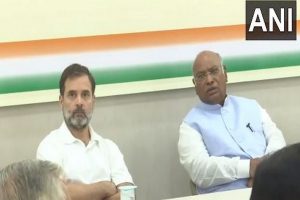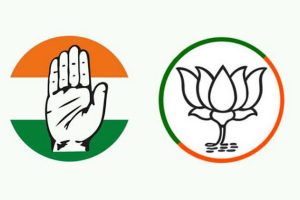A year after millions of people turned out for the Women’s March and took to the streets en masse to protest President Trump’s inauguration, demonstrators gathered in cities across the US, galvanised by their disdain for Trump and his administration’s policies.
The one in New York was expected to be one of the largest, with some 85,000 demonstrators registering for the event on the Internet, although the organisation noted that the actual figure ends up being higher. According to the mayor’s office, in 2017 it was 400,000, Efe news agency reported on Sunday.
Early in the morning, people were already on the move to join the rally west of Central Park, which was well attended and overflowing with “energy, empowerment and unity”, New Yorkers Lisa and Merely told Efe after the march.
With widespread criticism of the policies of the Trump Administration dominating the marches this Saturday across the country, the participants chanted one of their slogans, dedicated to the president on the anniversary of his arrival at the White House “Welcome to your first year, why the hell are you still here?”.
On his Twitter account, Trump seemed to ignore the general sentiment of the demonstrations and wrote that it was a “Beautiful weather all over our great country, a perfect day for all Women to March” and noting that the United States has the “lowest female unemployment in 18 years.”
Despite this, the vast majority of protesters were dissatisfied with the immigration and health care reform the Trump administration has promoted and demanded equal rights for women, immigrants and members of the LGBT community, and were shouting feminist slogans against sexual assaults.
In New York, was Leslie, a woman who, like many others, was wearing the same pink cap she wore in the first marchas a “symbol of a new wave of feminism”.
“It’s an important year because we can vote to reclaim the House and Senate and deny power to the president,” she told Efe, referring to the midterm elections to be held in November.
The Women’s March organization, which focused last year on Washington DC, because of its proximity to the Capitol, and when 500,000 people attended, on Saturday sought to turn the protests into political action, encouraging women to run for public office and to exercise their right to vote.
In Las Vegas, the capital of Nevada, which turned to Democratic candidate Hillary Clinton, the march will focus on the “PowerToThePolls” campaign and will feature Planned Parenthood and Black Lives Matter representatives on Sunday to boost voter registration and political mobilization.
Other prominent cities where thousands of people took to the streets on Saturday were Washington, Denver, San Francisco and Los Angeles, the latter with more notoriety because it concentrates much of the national film industry.
Actresses such as Viola Davis, Natalie Portman and Eva Longoria took the microphone to extol women’s empowerment and allude to the Hollywood harassment scandals uncovered in recent months, which have sparked feminist movements and social denunciation such as MeToo or Time’s Up.
On Saturday and Sunday, there are hundreds of global women’s rights marches and events planned in the capitals of countries such as Argentina, Kenya, China, Canada, Australia and Rome, but also in secondary cities and at the local level.












